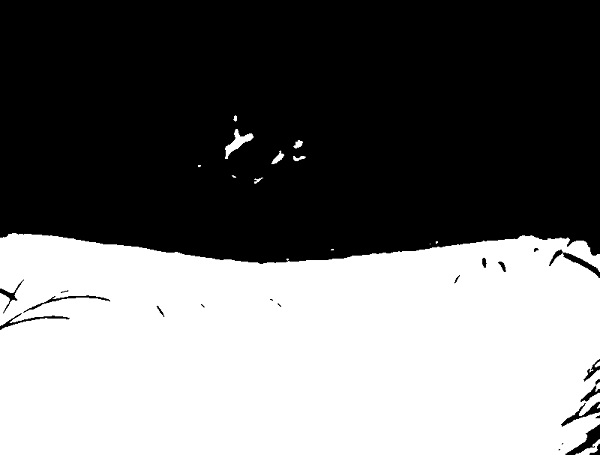opencv笔记--Kmeans
在图像分割中,使用 kmeans 算法可以实现图像区域基本分割。如果一幅图像被分为两类,kmeans 分割效果与 ostu 算法基本一致,具体如下图:



kmeans 将图像灰度聚类为 k 类,ostu 将图像灰度分割为 2 类,当 k = 2 时,两种算法最终目的基本趋于一致。
kmeans 算法基本思路如下:
1)随机选取第一个聚类中心点,之后的聚类中心点选取有两种方法;
a. 随机选取其他 k - 1 个聚类中心点;
b. 根据已经选取的聚类中心点,计算所有点到已经选取的聚类中心点的距离,选择到所有已经选取的聚类中心点的最远点作为下一个聚类中心点;
2)根据点到已经选取的聚类中心点的距离对其进行分类;
3)重新求各个分类的聚类中心点,然后回到 2);
4)当不再满足迭代条件时给出最终聚类结果,迭代条件包括:
a. 聚类中心点在迭代过程中的偏移量;
b. 迭代次数;
对于聚类中心点的选择,一般情况下,方法 b 会得到更好的聚类,且迭代速度较快。
opencv 提供的 kmean 函数为:
double kmeans( InputArray data, int K, InputOutputArray bestLabels, TermCriteria criteria, int attempts,
int flags, OutputArray centers=noArray() );
参数如下:
data: 待分类点矩阵,其类型必须为 CV_32F;
K,bestLabels: 聚类数与待分类点所属分类;
criteria:停止条件;
attempts:使用不同的随机聚类中心点尝试聚类次数;
flags:聚类中心点选择方案,包括完全随机选择,kmeans++选择方案(b),用户输入;
centers:最终聚类中心点;
以下给出 kmeans 算法使用代码:
1 void UseKmeans(cv::Mat& src, cv::Mat& rst) 2 { 3 int width = src.cols; 4 int height = src.rows; 5 int dims = src.channels(); 6 int sampleCount = width * height; 7 8 int clusterCount = 2; 9 Mat points(sampleCount, dims, CV_32F, Scalar(10)); 10 cv::Mat pos(sampleCount, 2, CV_16S, Scalar(0, 0)); 11 Mat labels; 12 Mat centers(clusterCount, 1, points.type()); 13 14 // invert to data points 15 int index = 0; 16 for (int row = 0; row < height; row++) { 17 for (int col = 0; col < width; col++) { 18 points.at<float>(index, 0) = static_cast<int>(src.ptr<uchar>(row)[col]); 19 pos.at<short>(index, 0) = static_cast<short>(row); 20 pos.at<short>(index, 1) = static_cast<int>(col); 21 ++index; 22 } 23 } 24 25 // k-mean algorithm 26 TermCriteria criteria = TermCriteria(CV_TERMCRIT_EPS + CV_TERMCRIT_ITER, 100, 1.0); 27 kmeans(points, clusterCount, labels, criteria, 3, KMEANS_PP_CENTERS, centers); 28 29 int bright_val = -1; 30 for (int i = 0; i < centers.rows; ++i) 31 { 32 int val = centers.at<float>(i, 0); 33 if (val > bright_val) 34 bright_val = val; 35 } 36 37 int bright_label = -1; 38 for (int idx = 0; idx < sampleCount; ++idx) 39 { 40 float *datapoint = points.ptr<float>(idx); 41 int *datalabel = labels.ptr<int>(idx); 42 if (datapoint[0] >= bright_val) 43 { 44 bright_label = datalabel[0]; 45 break; 46 } 47 } 48 49 // save result 50 rst.create(src.size(), CV_8UC1); 51 rst.rowRange(0, rst.rows) = 0; 52 for (int idx = 0; idx < sampleCount; ++idx) 53 { 54 int *datalabel = labels.ptr<int>(idx); 55 if (datalabel[0] == bright_label) 56 { 57 int row = pos.at<short>(idx, 0); 58 int col = pos.at<short>(idx, 1); 59 rst.ptr<uchar>(row)[col] = 255; 60 } 61 } 62 }



